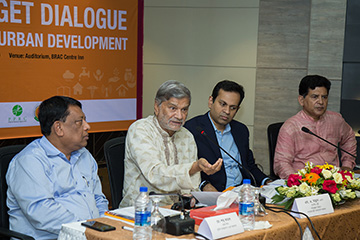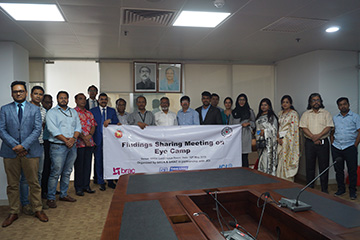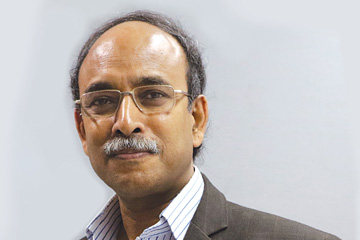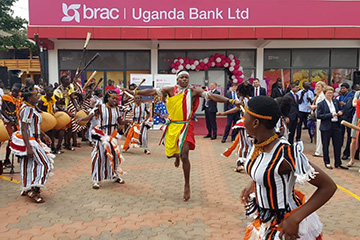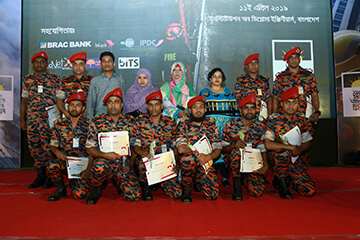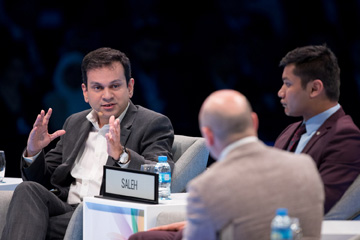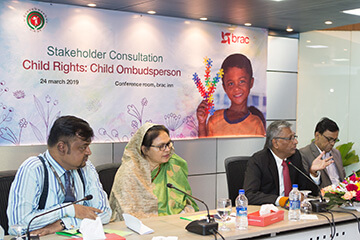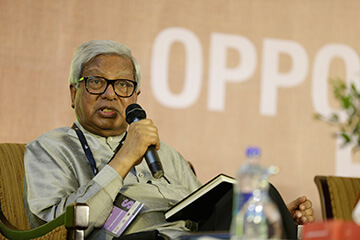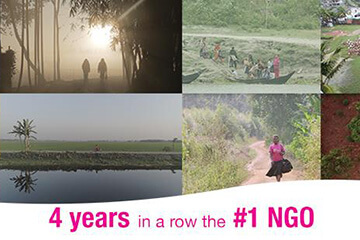
English (959)
Children categories
Pre-budget dialogue on pro-poor urban development
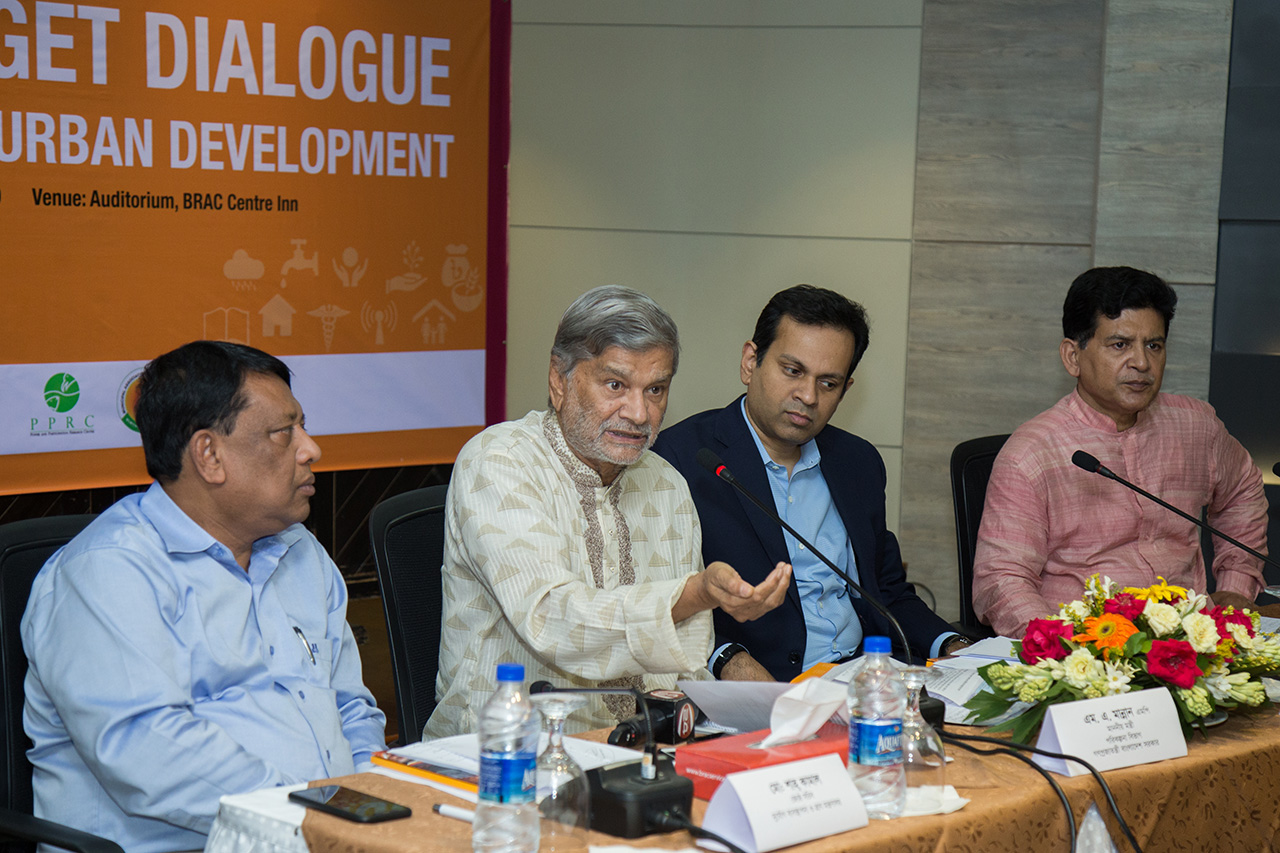
Insufficient public investment poses major challenge in tackling urban poverty
Inadequate government allocation, shortage of manpower, outdated laws and rules unable to address present needs, flawed development plans and programmes are plaguing the municipalities as they strive to provide different services to the ever increasing urban population. While the Seventh Five-year Plan of the Bangladesh government emphasises urban development and reduction of urban poverty, a number of issues, namely boosting economic development, undertaking effective strategy to achieve universal growth, and ensuring increasing public investment, remain as major challenges as the country strives towards achieving middle-income status.
Speakers and experts made these observations at a pre-budget dialogue on Monday (20 May, 2019) organised at BRAC Centre in the capital. World's number one development organisation BRAC, Municipal Association of Bangladesh (MAB), and Power and Participation Research Centre (PPRC) arranged the event.
M A Mannan, minister of planning and lawmaker, was present at the dialogue as the chief guest. S M Ghulam Farooque, senior secretary of the local government ministry, Md Shah Kamal, senior secretary of the disaster management and relief, Dr Shamsul Alam, senior secretary of Planning Commission, and Md Shahid Ullah Khandaker, secretary of housing and public works ministry were also present as guests at the event. Asif Saleh, acting executive director of BRAC chaired the event, moderated by PPRC executive chairman Dr Hossain Zillur Rahman.
Planning minister M A Mannan said, “The present government has undertaken a number of projects to provide housing to the urban poor, which include construction of multi-storeyed buildings, allocation of land, and housing loans. Several development projects including 'Dhaka environmentally sustainable water supply project,’ urban infrastructure development projects to build and maintain streets, footpaths, drainage systems, and projects to increase resilience of buildings against disasters, are going on. There will be adequate allocation in the national budget of 2019-20 to complete these projects.”
Local government expert Dr Tofail Ahmed, director of International Centre for Climate Change and Development Dr Saleemul Huq, MAB chairman and Bera municipality mayor Md Abdul Baten, joint general secretary and Madaripur municipality mayor Khalid Hossain, and BRAC Urban Development Programme's head Hasina Mushrofa, gave expert opinions among others at the dialogue. Representatives from other government and non-governmental organisations, Asian Development Bank, World Bank, Department for International Development (DFID), and other donors, universities, and media also spoke at the event.
Madaripur municipality’s mayor, Khalid Hossain, gave the keynote presentation on the challenges and future of pro-poor urban development of Bangladesh. It mentioned that to provide different services to the over 21.6 million dwellers of 327 municipalities across Bangladesh, there are only 43,000 permanent and 22,000 temporary employees. A number of recommendations to boost the municipal services forwarded in the presentation include significant increase in municipal budget, reform of municipal laws and rules to fit present day needs, provision of staff salary and benefit from the revenue component of the budget, special emphasis on pro-poor urban housing, effective waste and sludge management, and improvement in water supply system and infrastructure.
Local government expert Dr Tofail Ahmed said, “A general increase in the budget will not solve the problem. The wave of urbanisation has now hit the villages and is shrinking them. So we have to revisit our current development strategy. Here in Bangladesh, any development work is done in a sluggish speed, so a general talk about pro-poor development will not bring much fruit.”
MAB chairman and Bera municipality mayor Md Abdul Baten said, “We are constantly trying to put our limited resources to the very best use. But that itself is not enough. How is it possible to operate when the local government does not have even 2% of the share of the national budget?”
BRAC's acting executive director Asif Saleh said, “Public-private partnership initiatives can be undertaken to finance housing for the urban poor people. Also we should give special focus to tackle the increasing pressure of rural migrants on the urban space and fire hazards.”
Majority of bus drivers have some form of visual impairment
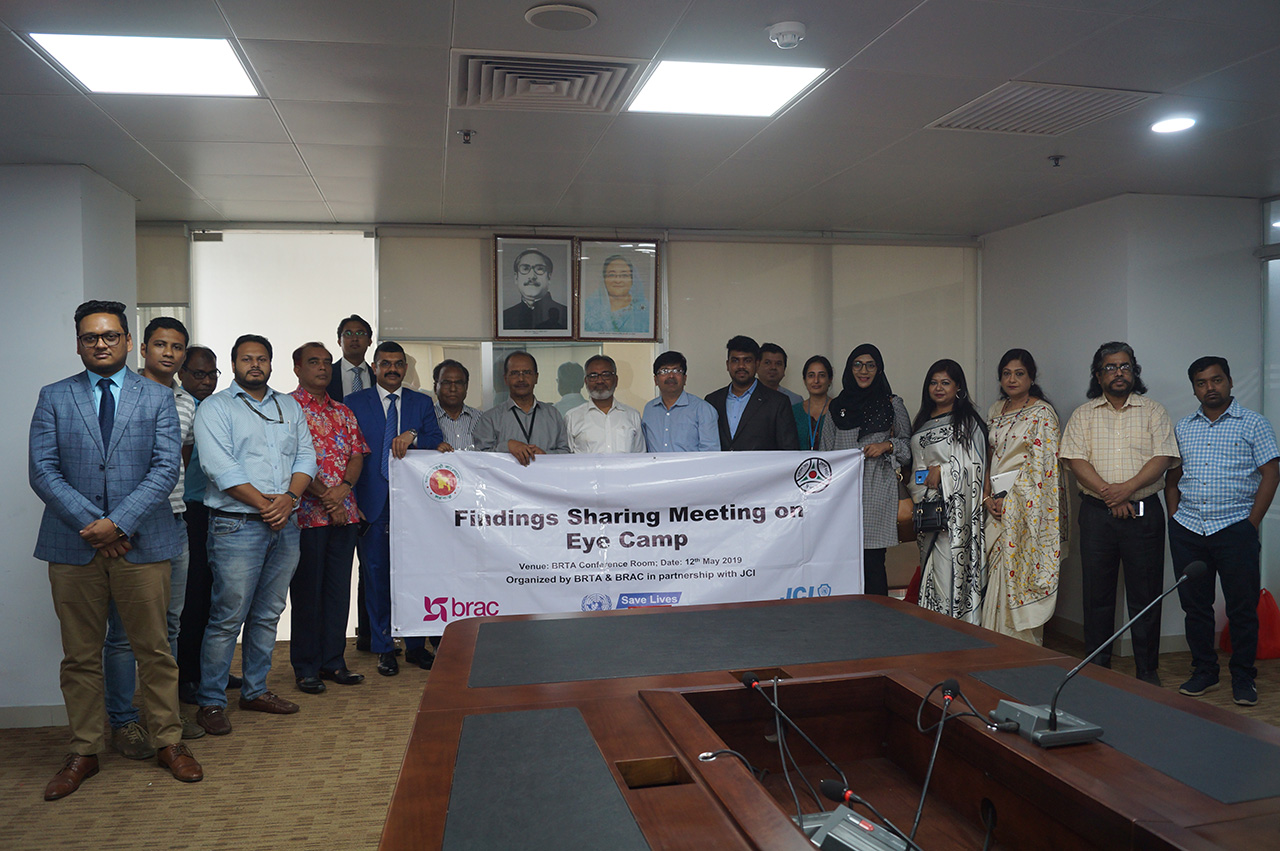
Around half of Dhaka city’s bus drivers and conductors are suffering from some form of visual impairment, while 72% of them have never been to an eye doctor. Every day, 21% of the city’s bus drivers and their helpers work shifts from 12 to 16 hours. 40% of drivers work eight to 12 hours a day. In these circumstances, reducing road accidents poses to be an impossible task. These were the outcomes of a discussion held on 12 May, 2019 at the BRTA Head Office in Banani.
The discussion was held to observe the fifth Global Road Safety Week. The event was organised by BRAC Road Safety Programme and Junior Chamber International (JCI) Dhaka West. Present was the director of BRAC’s road safety programme Ahmed Najmul Hussain, director of BRTA Sheikh Muhammad Mahbub-e-Rabbani, World Health Organisation’s representative Dr Tara Kessaram, JCI’s president Irfan Islam, and the chairman of Bangladesh Road Transport Owners Association Rustam Ali Khan.
On 23-24 April, BRAC and JCI collaborated on an eye care drive, where 1,200 bus drivers and conductors were provided with free eye care and doctors’ consultation. The service was provided by 30 doctors and medical assistants from the National Eye Science Institute and Hospital. The findings from the eye care drive were presented at the discussion.
The previous event for an eye care drive done earlier was hosted by Kamran Ul Baset, the head of Road Safety and Driving School at BRAC. The session delineated that 1,200 individuals were given care, out of which 91% were bus drivers and conductors. About 4% of recipients were motorbike and private car drivers, while 1% were drivers of heavy carrier vehicles. 5% of the drivers were over the age of 60 years, while 4% of the drivers were between the ages of 18-24. In the two-day long drive, glasses and medication were given to 76% of the recipients. 12.6% of individuals received surgical treatment, while 4.10% received medication only.
“More initiatives on drivers’ eye care are necessary,” said Sheikh Muhammad Mahbub-e-Rabbani, Director, BRTA.
JCI’s president Irfan Islam Said, “We plan to keep this initiative going throughout the year.”
BRAC International welcomes new Executive Director

Dr. Muhammad Musa has been appointed as the new Executive Director of BRAC International, BRAC’s international programme outside Bangladesh, operating in 11 countries across Asia and Africa. His appointment is effective from May 1, 2019.
Dr. Musa is a veteran development practitioner with extensive experience of working in social development and humanitarian organisations in international, cross-cultural settings. Before joining BRAC Bangladesh as its Executive Director in 2015, he worked for 32 years with CARE International as one of its senior international management professionals. Twenty of those years were spent working in Ethiopia, Uganda, Sudan, Tanzania, Thailand, India, Bangladesh and the Asia region. He served as the Chief Executive Officer of CARE India and represented the country at the global board of CARE International.
During his tenure as Executive Director of BRAC Bangladesh, Dr. Musa has succeeded in maintaining BRAC's focus on the many dimensions of poverty in Bangladesh. Under his leadership, BRAC launched the Humanitarian Crisis Management Programme for Rohingya refugees and host communities in Cox's Bazar in south-eastern Bangladesh in August 2017.
Dr. Musa obtained his Master's degree in public health (MPH) from Johns Hopkins University, USA, and post graduate diploma from The Netherlands Universities Foundation for International Development. He did his MBBS from Chittagong Medical College, Bangladesh.
He succeeds Faruque Ahmed, who is retiring after a dedicated and distinguished 17-year career at BRAC and BRAC International.
The recruitment of a new Executive Director of BRAC Bangladesh is in progress. Until the new Executive Director is appointed, Asif Saleh, currently Senior Director, Strategy, Communication and Empowerment, BRAC and BRAC International, will assume the role of Acting Executive Director of BRAC Bangladesh with effect from May 1, 2019. He will continue to discharge his current responsibilities alongside this additional leadership role.
“I am honoured and excited to continue moving forward BRAC’s vision of building an equitable world jointly with our talented staff spread across the world and global network of partners and supporters,” said Dr. Musa.
“I am eager to dive in and build on the excellent foundation laid by the inspired work of the BRAC International team to further BRAC’s global reach and potential for even greater impact,” he added.
BRAC Microfinance transforms into regulated bank in Uganda
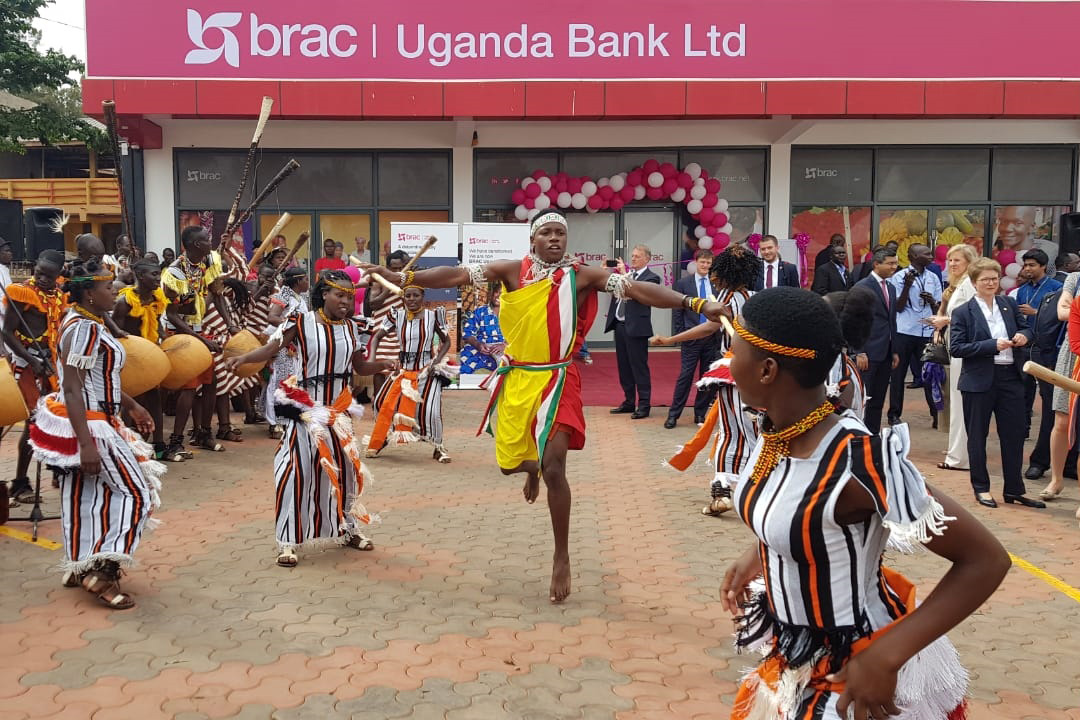
BRAC, the largest microfinance provider in Uganda, is transforming as a Tier 2 Credit Institution (CI) to broaden the range of financial services it provides to Uganda’s low-income communities. On behalf of the president, First Deputy Prime Minister General Moses Ali formally inaugurated the newly licensed institution - BRAC Uganda Bank Ltd (BUBL) at a ceremony held at the bank’s Kabuusu branch on April 25th 2019. Evelyn Anite, the State Minister of Finance for Investment and Privatization was also present at the ceremony.
BRAC started its microfinance programme in Uganda in 2006, growing its footprint to 163 branches across 84 districts with more than 200,000 clients. As part of its commitment to ensuring greater financial inclusion, especially for marginalised women in rural and low-income communities, BRAC has been pursuing a change in its regulatory status that would allow it to expand the scope of its financial services. The transformation will enable BRAC Uganda Bank Ltd to offer savings accounts, money transfer, insurance and other financial services in addition to its existing credit products to the people of Uganda.
In his remarks, First Deputy Prime Minister General Moses Ali said, “BRAC has a specific focus on women, youth and rural population. I am very much pleased that these are also the three priority areas of the comprehensive strategy that the Ugandan Government developed for financial inclusion”
“We are honoured and excited to have this opportunity to strengthen our ties with Uganda and contribute further in improving access to safe, reliable and fit-for-purpose financial services through our new banking operation. BRAC believes that given the right opportunities and tools, people living in poverty can turnaround their own lives. BRAC Uganda Bank will remain true to our core mission of enabling communities, particularly women living in poverty in rural, urban and hard to reach areas so that they can realise their potential,” said Shameran Abed, Senior Director of BRAC’s Microfinance and Ultra-Poor Graduation programme. “Our increased range of financial services will enhance self-employment opportunities, build financial resilience, and better harness our clients’ entrepreneurial spirit,” he added.
The transition from a Tier 4 credit only NGO to a Tier 2 CI will allow BRAC to drive more impactful financial inclusion at an even greater scale. "Our clients can now have the confidence and trust of saving at a formal institution, a critical component that ensures resilience for low-income households in times of social or economic shocks", said Jimmy Adiga, the CEO of BUBL.
As a part of the transformation process, BRAC has partnered with three mission-aligned investors - DEG - Deutsche Investitions- und Entwicklungsgesellschaft mbH, the German development finance institution, Equator Capital Partners, the experienced fund manager investing in financial inclusion, and Triple Jump, the Dutch impact-focused investment-manager advising the ASN Microkredietpool fund. The equity partners each bring unique value and expertise to BUBL and are excited to join BRAC in providing affordable and responsible financial services to the people of Uganda.
BRAC has hosted day-long events with its staff, partners, clients, regulators and other stakeholders to celebrate this hallmark achievement. Following the ceremonial opening in the morning by the First Deputy Prime Minister of Uganda, General Moses Ali at the head office branch of the bank, a launch event with the broader community of stakeholders took place at the Victoria Hall of The Kampala Serena Hotel later in the evening. Mr Mackay Aumo, Director of National Payments System, of Bank of Ugada delivered speech on behalf of the Deputy Governor of the Bank of Uganda.
About BRAC and BRAC Uganda Bank Ltd
BRAC started as a limited relief operation in 1972 in a remote village in Bangladesh and has grown to become the largest development organisation in the world impacting the lives of 1 in every 55 people on the planet. BRAC uses a holistic approach to development engaging a wide range of tools to promote inclusion such as microfinance, health and nutrition, education, youth, agriculture and food security, research, community empowerment, disaster management and climate change, targeting ultra-poor, social enterprises, water, sanitation and hygiene, poultry and livestock. BRAC was ranked the number 1 NGO in the world in 2019, for the fourth year in a row, by the Geneva-based organization, NGO Advisor.
BRAC’s first international expansion was into Afghanistan in 2002 and it currently has affiliates in 13 countries with a focus on Asia and Africa. In Uganda, BRAC has been working since 2006 to advance women’s empowerment, provide education for children and adolescent girls, address gender-based violence issues, improve livelihoods and skills for smallholder farmers, and support people to lift themselves out of ultra-poverty through its NGO entity. BRAC’s microfinance activities in Uganda have been carried out under a separate entity, BRAC Uganda Microfinance Ltd (“BUML”). From 2008 to 2018 BUML increased borrower numbers from approximately 60,000 to over 200,000, and its branch network from 61 to 163. In 2016 the decision was taken to transform into a Tier 2 Credit Institution, and after completing all the regulatory requirements, BRAC received the licence as “BRAC Uganda Bank Ltd” in March 2019.
BRAC pays honour and gratitude to fire-fighters
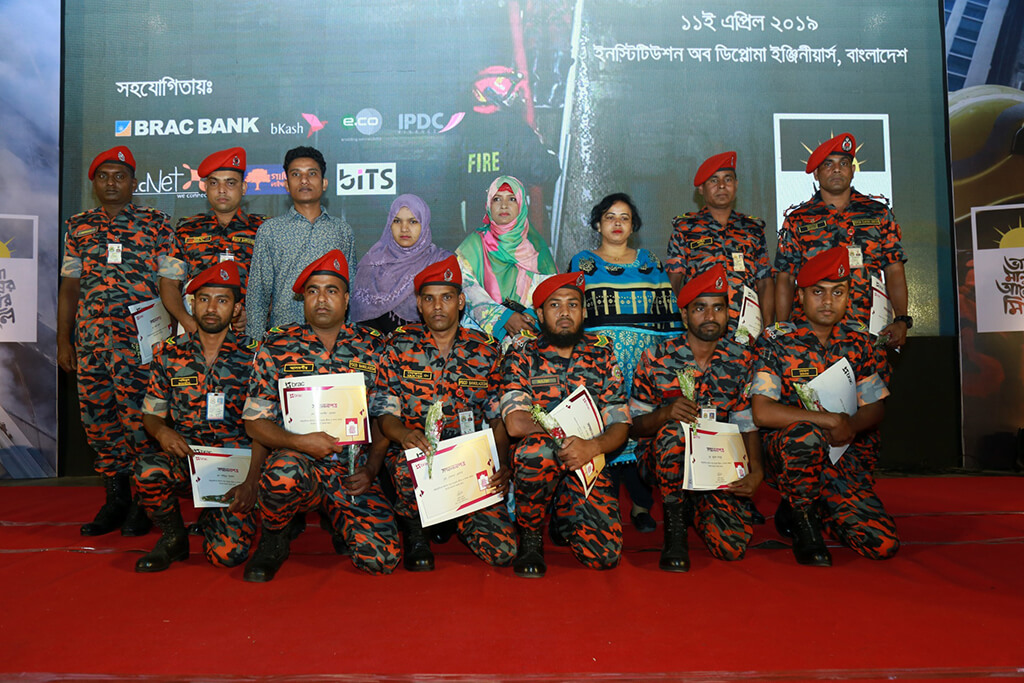
Dhaka is still reeling from the shock of devastating fires that gorged across the city, from north to south, west to east. Korail slum in Gulshan, Chawkbazar in Old Dhaka, Mirpur - one after another spots were devoured, claiming lives and destroying means of livelihood for countless families. The city dwellers was still recovering from shock when FR Tower in Banani was engulfed in yet another blaze taking lives of 27 people. No sooner the last flame was doused in FR Tower, than a fire ravaged DNCC market in Gulshan. Amidst the scenes of inexplicable human misery and destruction, triumphed the fearless human beings who plunged themselves into saving lives from the traps of blazing fire.
They are the fire-fighters of the directorate of Bangladesh Fire Service and Civil Defence. The army of its trained personnel rush themselves in at any spot at the call of emergency at any hour of the day. In recent times the nation time and again watched them to walk, climb, crawl, creep, whichever way possible, to reach the people trapped under the rubble of collapsed buildings or in raging flames and rescue them. Risking their own lives, our firemen saved lives. The truth which their families and children live every day is that they can lose their loving ones any day. Fire-fighters live the brave truth - lay your life to save other lives. Triumph of humanity is what they live for.
To pay respect and gratitude to our fearless heroes BRAC organised a reception event today on Thursday (11 April 2019) at the auditorium of the Institution of Diploma Engineers at Kakrail in the capital. The event began at 3.30 in the afternoon and had honourable guests Dhaka North City mayor Md Atiqul Islam, Fire Service and Civil Defence director-general Brigadier General Md Sazzad Hussain and director (operation and maintenance) Major AKM Shakil Newaz. The event was organised with assistance from BRAC Bank, edotco Bangladesh, Bkash, IPDC Finance, BRAC Net, Guardian Life Insurance, BRAC IT Services and Ekattor TV.
At the programme, a cheque of Tk 4 lakh was handed over from BRAC to the family of Sohel Rana who died after severely injured during his work at the FR Tower fire rescue. A donation of Tk 3 lakh was also made to the Fire Service and Civil Defence trust fund. Survivors of different fire incidents gave bouquet and certificates of honour to 10 fire-fighters who are, Sohagchandra Karmakar, Bishnupada Mistry, Zakir Hossain, Kazi Sohag, Shahidul Islam, Jewel Mahmud, Mafizul Islam, Alamgir Hossain, Nazir Hossain and Moktar Hossain.
DNCC mayor Md Atiqul Islam said, "No more we want to see these helpless deaths. The builders of multi-storied big buildings must keep all the arrangements to tackle fire hazards. Otherwise, they will face stern punishment."
Brigadier General Md Sazzad Hussain thanked BRAC for this initiative and said, "This recognition will further boost our morale. On this occasion, however, our request to the nation will be: Please do not crowd the scene of the hazard and let our fire-fighters and rescuers work without hindrance. It is the general public who have to come forward to ensure this. With your proper assistance we will be able to reduce the loss of both lives and property."
A number of important setbacks were identified in the discussion at the programme including, delay in reaching information to the proper authority, crowds hindering rescue work, absence of fire hydrants or source of water, shortage of fire extinguishing equipment in multi-storeyed buildings, lack of training of personnel, and absence of fire exits in buildings.
Education is the only hope for children's future
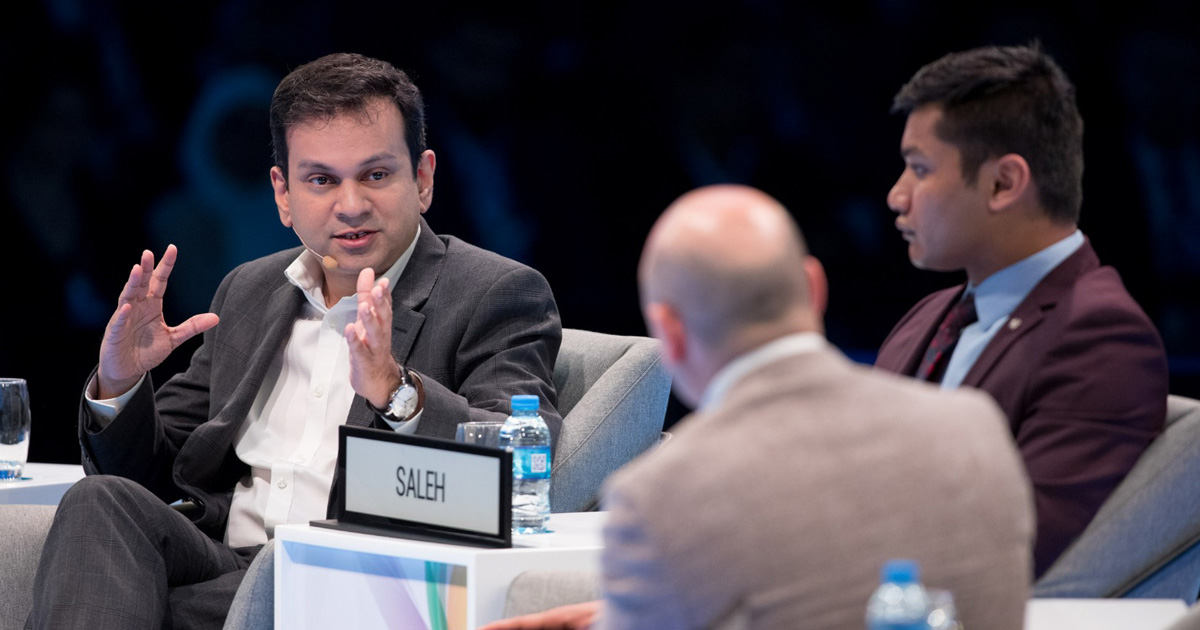
The seventh annual Global Education & Skills Forum 2019 opened on 23rd March at The Atlantis, The Palm, Dubai, UAE, with an emotional plea by Rohingyas to support the education of refugee children, whose only hope for the future rests on it. Addressing the audience, Ahmed Ullah, organiser of peace rallies and co-writer of ‘I Am Rohingya’ and Zainab Arkani, who runs the world’s first Rohingya school in Canada, said ensuring the education of the children is the only way forward to rebuild their lives.
Held under the theme of ‘Who is changing the world?’, the Global Education & Skills Forum (GESF 2019), a Varkey Foundation initiative, brings together more than 2,200 delegates from 144 countries, who will discuss pressing challenges in the education sector – as well as in society – through 124 sessions. Seven former heads of state and 40 ministers of education attended the Forum, joined by a new generation of change-makers, including grassroots activists, philanthropists, tech developers and many more, who are shaping the world with new voices, new ideas and new technologies.
Asif Saleh, Senior Director – Strategy, Communications and Empowerment, BRAC, the NGO, said Bangladesh opened doors to over 700,000 Rohingya refugees and provided emergency support. “The greatest challenge now is to ensure children have access to education and skills training or risk losing out a large generation of people.” He said that donor fatigue is setting in with only about 40 per cent of the current year’s need of over US$600 million met. “We need to have a mid-term solution – and that is skills building and creating livelihood opportunities to create self-sufficiency.”
Source: https://www.newasianpost.com/global-education-skills-forum-2019-opens-with-plea-by-rohingyas/
Founding of specialised commission and child ombudsperson urged
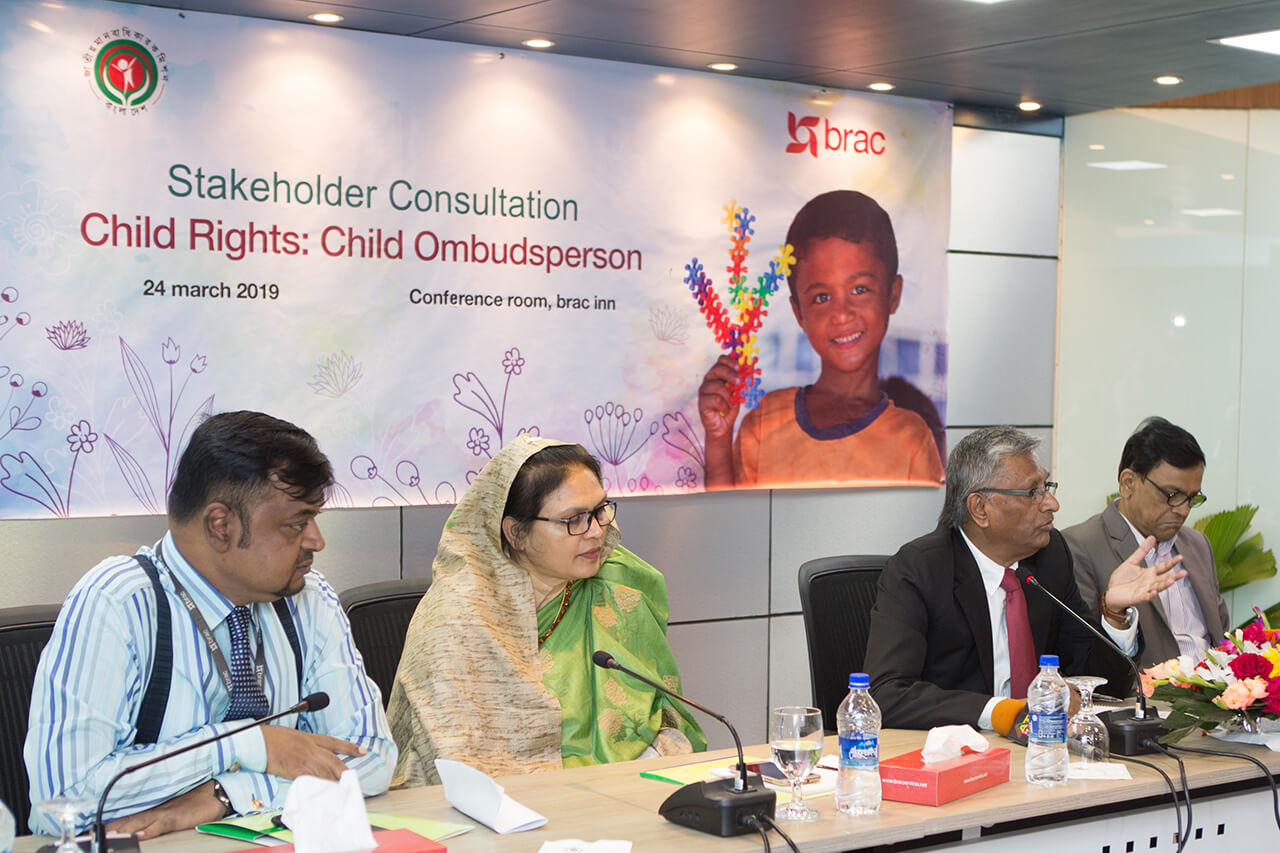
Despite commendable progress in many sectors, Bangladesh is still fraught with the lack of proper initiatives and institutions essential for children's development. Access to education for all children has yet not been achieved fully. On the other hand, children going to school is overburdened with books and study pressure. Child labour is still pervasive. To promote and protect child rights and wellbeing it is high time Bangladesh established the office of the child ombudsperson.
Speakers made these observations today on Sunday (24 March) at a stakeholder consultation meeting titled "Child rights: Child ombudsperson" organised at BRAC Centre in the capital.
National Human Rights Commission (NHRC) and BRAC arranged the meeting in which BRAC director for advocacy, technology and partnership programme KAM Morshed gave the welcome speech. Moderated by NHRC chairperson Kazi Reazul Hoque, the event was attended, among others, by senior secretary for ministry of social welfare Juena Aziz, additional secretary for women and children affairs ministry Laila Jesmin and director of BRAC Education Programme Safiqul Islam. Representatives from Save The Children, International Organisation of Migration (IOM), Plan International and other organisations were also present.
The speakers mentioned that the government has undertaken many plans and initiatives to ensure a conducive environment for children's development by reducing poverty and meeting their essential needs. Specialised programmes are being implemented to rehabilitate extreme poor and homeless children, stop child labour, prevent use of children for political purpose and create healthy environment for children's physical and mental development through education and entertainment.
In the context of the rapidly changing needs worldwide and according to the recommendations of the UN Convention on the Rights of the Child (UNCRC), the government of Bangladesh has already updated the National Child Policy in 2011, originally enacted in 1994. Though appointment of a child ombudsperson is binding by Section 10.3 of this policy, the appointment has not been made till now.
NHRC chairperson Kazi Reazul Hoque said, "We have to do two things first, one, eliminate all forms of child labour, and two, strengthen GO-NGO collaboration. To do that we are regularly meeting with different non-governmental organisations to exchange experiences. We compliment the decision not to take examinations up to Standard Three. We also want that the students of Class Five are free from the stress of public examinations."
BRAC Education Programme director Safiqul Islam said, "We are eager to work collaboratively with NHRC to promote the rights of the children."
Speakers also informed the meeting that the government has established a child commission through a series of consultation with the stakeholders.
Youth should focus on climate change for a sustainable future: Sir Fazle

Today’s youth should be very concerned about climate change because it will heavily impact their future, said Sir Fazle Hasan Abed, founder and chairperson of the world’s largest non-governmental organisation BRAC.
“Unless we change human behaviour in terms of consumption of resources, the future will not be sustainable. I would like to see more youth involvement with issues relating to climate change. Sustainable development is the key,” he added.
Sir Fazle Hasan Abed made the remarks while speaking at the final day of Frugal Innovation Forum held at BRAC CDM in Savar, on Monday (4 March 2019). BRAC organised the forum with the theme: “Scaling opportunities for youth.”
“The youth should understand the distinctions between government and policy and play a more engaging role in policymaking,” said Radwan Mujib Siddiq, trustee of Centre for Research and Information (CRI), while speaking at a session on how to increase youth engagement in different spheres of the society.
During a debate session, Dr Debapriya Bhattacharya, honorary fellow of Centre for Policy Dialogue (CPD), said: “If you look at the issues we see and the initiatives we take, there are noble initiatives. But, at the end of the day, governance is the major issue beyond which, you will not be able to solve the problems. You will have to really come out and work.”
Frugal Innovation Forum is a platform for leaders from the Global South to connect and explore solutions to the world’s toughest challenges that features development practitioners and funders, young changemakers and innovators to collaborate for impact at scale.
Asif Saleh, senior director of BRAC and one of the key organisers of the forum, said: “We are talking about the future of jobs as youth problems are not limited to poverty anymore, it’s about security as well. This forum is about real models of what is actually happening and which model is applicable.”
The conference kick-started with a day-long field visit to give the participants an exclusive experience of frugal innovations in Bangladesh, followed by two days of intense debates and plenaries on disruptive models and solutions. The discussions, workshops and plenaries focused on: 21st century skills; impact of technology on youth; and youth on the move.
NGO Advisor's Global Ranking: BRAC named world's number one NGO
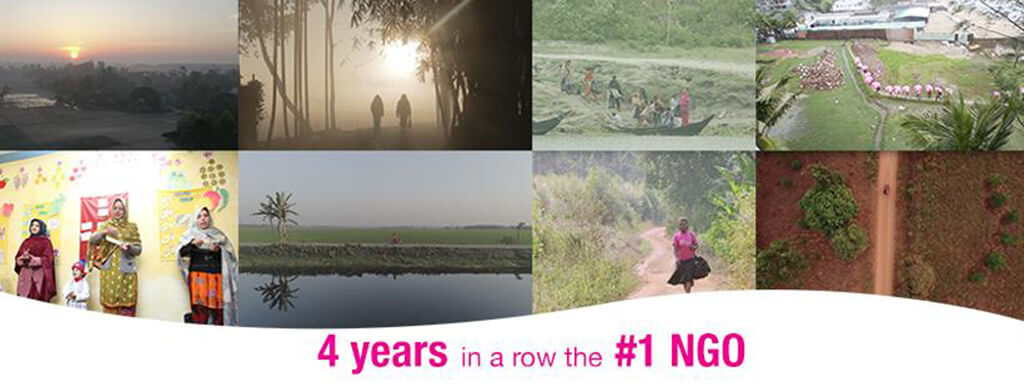
BRAC, the largest non-governmental organisation in the world and global leader in developing cost-effective, evidence-based programmes in conflict-prone and post-disaster settings, has been announced the world’s number one NGO of 2019 by NGO Advisor, an independent media organisation based in Geneva.
BRAC retained the top spot for the fourth year in a row in part due to its leadership of the Rohingya refugee crisis, innovative new partnerships, and the continued scale of its reach.
"The 2019 list reflects the many changes in the sector in the past year, with a number of new organisations appearing for the first time,” said Jean-Christophe Nothias, chairman of NGO Advisor. “On the top seat, BRAC not only preserved its position, but improved on several key criteria, leveraging its competitive mix of long-term vision and resilience in an ever-changing international landscape.”
BRAC Founder and Chairman Sir Fazle Hasan Abed said: “I am delighted to learn that BRAC has again been ranked at the top among international NGOs. I congratulate our colleagues and partners whose dedicated work to fulfil our mission has helped us to achieve this unique distinction.”
NGO Advisor commits to highlighting innovation, impact, and governance in the non-profit sector. Its Top 500 NGOs of the World rankings are based on three pillars: innovation, impact and sustainability, with a special focus on organisational governance. It evaluates hundreds of NGOs against this criteria and ranks them using a robust methodology.
“This ranking belongs to the entire BRAC family across the world. The strength of this organisation, for 47 years, comes from the people we work for, and the local, national and global government and non-government development partners we work with. We share this achievement with all of our partners in this journey. We will continue to strive until the result of progress reaches equitably to every single individual,” said Dr. Muhammad Musa, Executive Director of BRAC Bangladesh.
According to NGO Advisor, this achievement has to do, among other noticeable successes, with BRAC’s leadership regarding the Rohingya refugee crisis, its pioneering new partnerships, and the continued professionalism of its ever-growing team.
“BRAC works with people living in situations of inequality and disadvantaged communities around the world. We develop proven approaches to address poverty and empower vulnerable people at scale, and bring our programmes to where they are most needed,” said Faruque Ahmed, Executive Director of BRAC International.
The assessments for the ranking draw on publicly available information – including financial, human resources, governance, and marketing and communications data – and consider any not-for-profit or public-interest organisation that is active at the local, national, or international level.
In this year’s rankings, BRAC is joined by NGOs at the vanguard of the international development sector, with Médecins Sans Frontières, also known as Doctors Without Borders; the Danish Refugee Council; Open Society Foundations; and Mercy Corps in the top five.
Professor Mohammad Tamim New Pro-VC of BRAC University
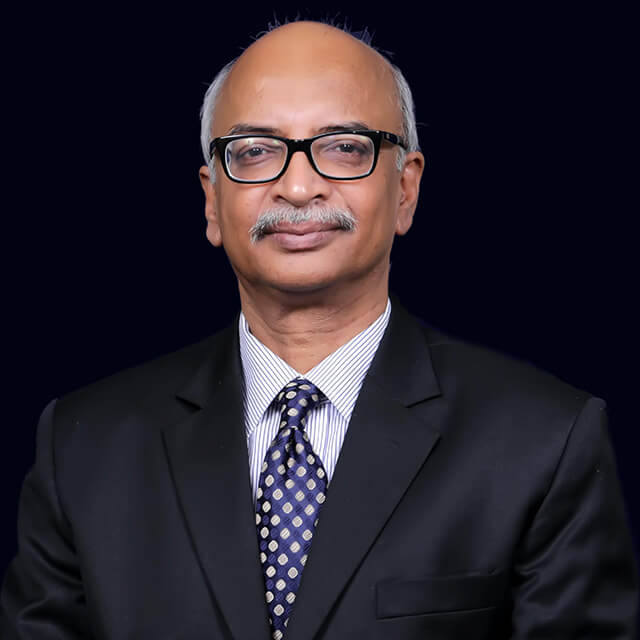
Professor Mohammad Tamim has recently joined BRAC University as its new pro vice-chancellor. He has more than 30 years of experience of university teaching, research and administration as well as both the government and private sectors. He has also led many joint projects of overseas universities and multilateral aid agencies.
Professor Tamim's spectacular career includes significant contributions in the field of energy policy and planning. He had served as a consultant for different projects of international agencies such as World Bank, JICA and USAID. He was also special assistant to the chief adviser of the caretaker government of Bangladesh in 2007-2008 with responsibility for the ministry of power, energy and mineral resources. He has significantly contributed in policy formulation and planning and implementation of the electricity and fuel sector.
Before joining BRAC University, he was a professor at the department of petroleum and mineral resources engineering department in Bangladesh University of Engineering and Technology (BUET).
Professor Tamim received his PhD in petroleum engineering from the University of Alberta, Edmonton, Canada. He had obtained his master's degree in mechanical engineering from the Indian Institute of Technology (IIT), Madras, India, and did his bachelor's degree in the same subject from BUET.
Join the world’s biggest family

